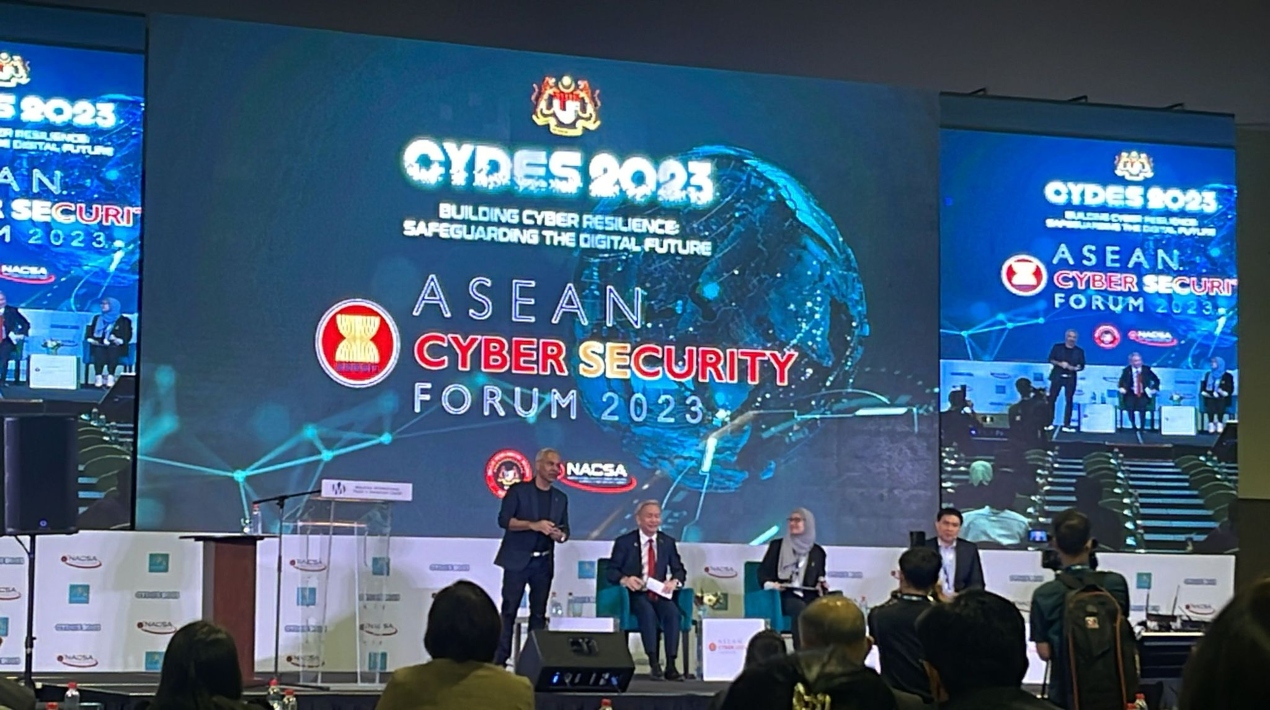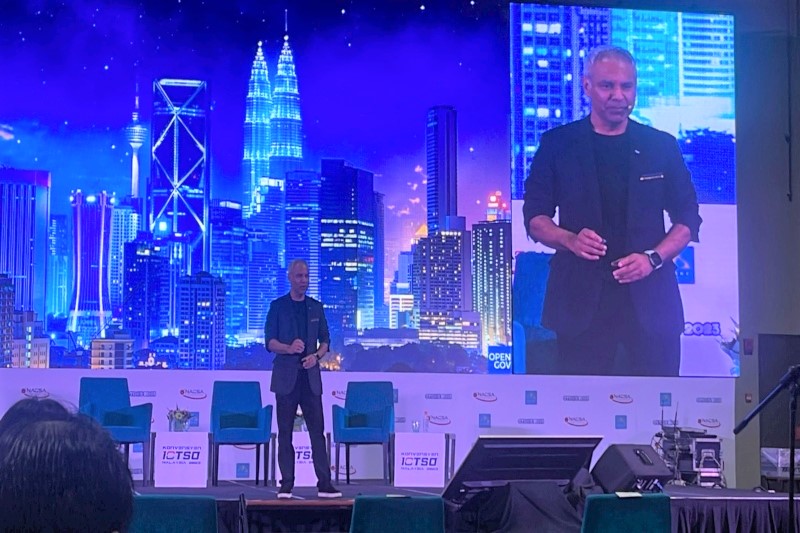
|
Getting your Trinity Audio player ready...
|
“To invest or not to invest, that is the question,” says Mohit Sagar, CEO and Editor-in-Chief of OpenGov Asia, paraphrasing a famous Shakespearean quote.
A keynote speaker at the world’s first integrated cyber defence, cybersecurity and emerging technology event – CYDES 2023 – for the global community recently held at the Malaysia International Trade and Exhibition Centre (MITEC), Kuala Lumpur, Malaysia, Mohit knows well the criticality of cyber resilience for both the public and the private sectors.
Expounding on the theme of “Building Cyber Resilience: Safeguarding the Digital Future,” he stresses the formidable nature of cyber threats faced by countless enterprises currently. These pervasive cyber-intrusions have inflicted a myriad of complexities upon businesses, resulting in financial losses, privacy breaches, and significant erosion of customer confidence.
Mohit emphasises that the risk posed by cyber threats extends beyond individuals and impacts society as a whole, encompassing all sectors, industries and nations. It is not confined to the concerns of a single person; rather, it poses a collective challenge that requires collaboration and cooperation from all entities.
The key to managing the complexity of this issue is cooperation across industries, agencies and stakeholders. Indeed, the only way to effectively combat the potential dangers and harm caused by constant cyber threats is through collaborative efforts.
The government plays a critical role as the guardian of national stability and security. Its active involvement in developing collaborative platforms and opportunities supported cybersecurity policies and laws, along with providing necessary resources and support is crucial.
Simultaneously, the commercial sector must enhance its efforts to implement robust cybersecurity procedures and ensure the integrity of its infrastructure.
This unified approach will enable everyone to better understand, prevent, and respond to cyber-attacks, ultimately safeguarding our digital future and mitigating the risks that threaten our interconnected society.
All people, whether citizens or clients are essential stakeholders in the battle against cyber threats. They can contribute significantly by identifying and reporting any unusual activity, thereby helping to prevent attacks from causing significant damage. By increasing aw areness of potential hazards and the importance of cybersecurity, they play a crucial role in fortifying the overall defence against cyber threats.
areness of potential hazards and the importance of cybersecurity, they play a crucial role in fortifying the overall defence against cyber threats.
Mohit endorses the Bring Your Own Device (BYOD) initiative, which allows employees to utilise their personal devices, such as cellphones, computers, tablets, or other mobile devices, for work-related tasks under a company policy or practice. This approach enables employees to access company networks, systems, and data without being solely dependent on organisation-provided equipment.
The popularity of BYOD in the workplace has surged for several reasons, including cost savings for businesses. By allowing employees to use their own devices, employers can avoid the expense of purchasing new equipment This cost-saving approach can help conserve financial resources, allowing organisations to allocate funds to more strategic endeavors and initiatives.
When employees use their own devices, they feel more comfortable. The familiarity and personalised settings of their own devices create a more user-friendly and efficient work environment, contributing to higher levels of job satisfaction and better overall performance.
Several ASEAN nations, including Brunei, Cambodia, Indonesia, Laos, Malaysia, Myanmar, the Philippines, Singapore, Thailand, and Vietnam, have begun to, more widely, adopt this approach.
“I’m pleased that BYOD is being implemented and is continuously growing, particularly in ASEAN,” Mohit says. “As the employees become more mobile and companies embrace hybrid work models, BYOD offers the needed flexibility and convenience for employees and organisations, leading to improved productivity and job satisfaction.”
However, Mohit acknowledges that the use of personal devices poses some challenges regarding data security and privacy, as they may not be as secure as company-owned devices. Therefore, implementing robust measures to address these concerns is essential to ensure the safe and secure handling of sensitive information on personal devices.
Organisations that implement BYOD policies recognise the importance of addressing security concerns associated with personal devices. To mitigate risks and protect sensitive information, they establish security rules and methods specifically tailored to secure data on these devices. This could involve strict security procedures, encrypting critical data and protecting personnel devices.
Additionally, organisations must ensure that employees are well-informed about best practices in data security and adhere to these guidelines diligently. Providing awareness, education and training on sound security practices for staff members goes a long way in achieving this.
By implementing these measures, organisations aim to strike a balance between the benefits of BYOD and maintaining a high standard of data security.
“With a careful approach and the right strategy, BYOD can become a powerful tool to increase workplace efficiency and flexibility in ASEAN countries,” he explains.
When a company allocates a budget for cybersecurity, it should be seen as an investment rather than an expense. He likens it to purchasing insurance, where not only the cost is covered, but also an investment is made in the organisation’s security for a safer future.
When organisations invest in strengthening their defence against cyber threats, they are safeguarding their future, limiting the risk of major financial losses, reputational damage, and a loss of trust among consumers and stakeholders.
Mohit stressed that cyberattacks can happen at any time and on various scales, carried out by individual attackers and larger organised groups. Thus, cybersecurity concerns should never be disregarded. Investing in technology, infrastructure, and trained human resources is a preventive, proactive approach to safeguard organisations from the detrimental impacts of cyberattacks.
Moreover, in an interconnected and digital society, security concerns have grown increasingly complex, encompassing various aspects like cybersecurity, data protection and physical security. Therefore, organisations must acknowledge that establishing a robust and enduring security system is essential to safeguard their assets, including customer data, corporate secrets, and intellectual property, which form the foundation of their organisational value
“We require security to remain competitive in the market,” Mohit reaffirms. “Amid intense competition, security stands as a crucial factor in sustaining a company’s position and edge.”
By implementing integrated, cutting-edge security measures, organisations gain the confidence to compete in innovative and progressive ways. When customers witness that data security and privacy are treated with utmost seriousness, they will have more trust in the services and products offered. As a result, organisations can build stronger client relationships and cultivate a large network of loyal customers.
Moreover, effective security enables organisations to concentrate on innovation and product development. When they have the assurance that assets and data are secure, they can freely allocate resources and energy to invent innovative solutions, improve product quality, and explore new market opportunities. This sense of security fosters an environment conducive to creativity and growth, leading to continued progress and success.
“As the digital landscape becomes more challenging and complex, people may not be able to safely navigate it,” Mohit explains. “This phenomenon is more common when technology rapidly evolves and safety measures try to keep pace.”
When a security system becomes overly complex and difficult to understand, many people may feel intimidated and reluctant to adhere to established security protocols. Feelings of confusion, difficulty following intricate steps, or an inability to meet strict standards can all contribute to this hesitation.
It should be acknowledged that in certain situations, security complexity is necessary to safeguard highly sensitive or critical assets. However, if these intricacies are not adequately defined or explained to users, they may resort to shortcuts or disregard these security regulations altogether.
“Additionally, we must remember our people are our most valuable assets. Organisations need to prioritise good governance, even though many individuals in positions of power may not be fully tech literate,” Mohit emphasises. “Organisations must take proactive measures to raise awareness about the significance of cybersecurity, enabling them to allocate sufficient funding to this critical area.”
In this ever-connected era, having a well-educated and knowledgeable team or designated individuals in cybersecurity is crucial. Companies or organisations that depend on employees with the necessary expertise can rest assured and concentrate on their core activities and objectives, free from the constant worry of cybersecurity threats.
Mohit is a strong advocate of technical collaborations, where entities work together to develop, use, or promote technology-related products, services, or solutions. Technology collaborations allow businesses to combine their resources and knowledge, bridging gaps in each other’s skills. Such partnerships have the potential to generate more comprehensive and innovative solutions.
“As the digital landscape evolves and cyber threats loom, the key to success lies in proactive investments, unified efforts, and a knowledgeable workforce, fortifying our collective defence and securing a thriving digital ecosystem,” concludes Mohit.
















